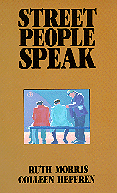


|
Street People Speak.
Ruth Morris and Colleen Heffren.
Oakville, ON: Mosaic Press. 150pp, paper, $9.95.
ISBN 0-88962-364-3.
Subject Heading:
Homeless persons-Ontario-Toronto-Case studies.
Grades 10 and up / Ages 15 and up.
Review by Kathleen L. Kellett-Betsos.
|
excerpt:
"Did you ever watch a streetcar go by, and see the whole streetcar
look at you with disgust? I have been on that corner, and seen those
looks. They should think, `Thank God, through the grace of God, I am not
there.' Because the same thing could happen to them."
This book is a timely antidote to the abundant myths we've all heard
about life on the streets: "Those people choose to be there; they're all
lazy drunks anyway; they don't care about anyone or anything" and, most
of all, "it couldn't happen to me and mine." Ruth Morris, a Ph.D in
sociology/social work from the University of Michigan, and Colleen
Heffren, a community educator and poverty activist, have based this book
on interviews of eighty-two street people, taken from as wide a variety
as possible in terms of sex, age, race, family situation, and length of
time on the street.

Through personal accounts about life on the streets, the ins and
outs of hostels and drop-in centres, the street people interviewed make
it clear that being homeless is very rarely a matter of choice. More
compelling than mere statistics about nameless individuals, these
interviews elicit compassion and understanding. One particularly eloquent
speaker is Jerry, a bright kid whose relatively well-off parents, unable
to cope with his rebelliousness, handed him over to Children's Aid at the
age of fourteen. Men such as Chuck and Tom recount their experience of
hitting the bottom when their marriages broke up and they were cut off
from ex-wives and children.
Carol and her child ended up living in a hostel after her husband
abandoned them. When his wife died, Sol began drinking, which lead to
problems at work, then loss of his job, and, eventually, life on the street.
André had to bring his wife and baby to a family hostel after he
lost his fifteen-dollar-an-hour job. Many complain about this trap: job loss leads to homelessness, which in turn makes it next to impossible
to get a job. Other factors include mental illness, systemic
discrimination against native peoples, alcoholism, and illiteracy. Most
of all, homelessness is the result of a lack of affordable housing, in
part, because of the gentrification of city neighbourhoods and the loss
of single-room occupancy housing.

In their chapter on possible solutions to the problem of
homelessness, Morris and Heffren stress that more hostels, however
essential these may now be to many of the homeless, are not the answer.
Their suggestions include increased nonprofit and low-income housing, an
increased minimum wage, a minimum income for those with children, and a
tax credit for each child.
Despite an irritating number of typographical errors, this book is
important because it gives an authentic representation of life on the
street, through interviews and photographs and poems written by street
people. Its presentation of the plight of the homeless and possible
solutions to poverty would be a good starting place for discussion in
secondary school classes from grade ten on.
Recommended.
Kathleen L. Kellett-Betsos is a French Professor at Ryerson
Polytechnic University in Toronto.
If you would like to comment on this review or anything else in
CM please send mail to cmeditor@mts.net

Copyright © 1995 the Manitoba Library Association.
Reproduction for personal use is permitted only if this copyright notice
is maintained. Any other reproduction is prohibited without permission.
Published by
The Manitoba Library Association
ISSN 1201-9364
 Go back to CM Welcome page
Go back to CM Welcome page
 Go back to Table of
Contents for this Issue
Go back to Table of
Contents for this Issue





![]()
 Go back to CM Welcome page
Go back to CM Welcome page Go back to Table of
Contents for this Issue
Go back to Table of
Contents for this Issue